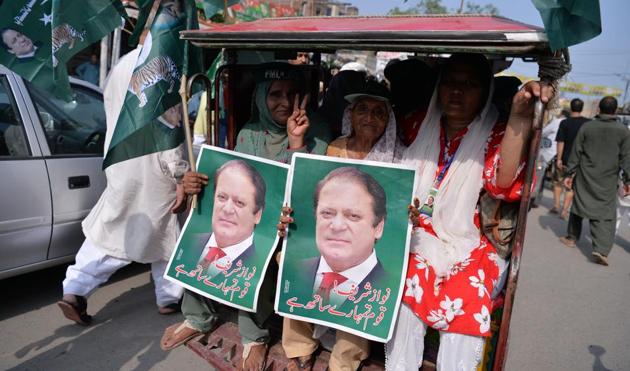Nawaz Sharif: a brave, rich man who unsettled the army more than Benazir Bhutto could
Sharif is in the middle of his fifth battle with the country’s military leadership, the reason why the army is suspicious of him. Equally unsettling for them is his mass base in Punjab.
The rich usually tend to not fight powerful establishments. They capitulate as they’ve much at stake to lose. That’s where deposed Prime Minister Nawaz Sharif defies the trend as the inheritor of Pakistan’s foremost business family.

Political tumult and early loss of power are the leitmotif joining his three terms in office over nearly three decades. Since he first became PM in 1990, Sharif has been sacked, ousted in a coup, exiled and now prosecuted and jailed for graft.
A protégé of Zia-ul-Haq who made him chief minister of Punjab in the 1980s, Sharif is in the middle of his fifth battle with the country’s military leadership or what Pakistani commentator Najam Sethi calls Milt-establishment. The earlier army dispensations he fought or from whom he sought to secure the civilian space were led by Generals Asif Nawaz Janjua, Abdul Waheed Kakar, Jehangir Karamat and Pervez Musharraf.
That is one reason why the army top brass is suspicious of him. Equally unsettling for them is his mass base in Punjab they have sought to balkanise by putting restrictions on assembly--- and by organising defections from his Pakistan Muslim League to Imran Khan’s party.
Forever reluctant to subordinate his mandate to the army, Sharif once counter-questioned me in frustration: “What are we here for, washing cutlery, if they’ve to run the country?”
Sharif’s first term had him in a head-to-head with President Ghulam Ishaq Khan. The Milt-establishment backed presidency won the first round. Sharif got the boot in the manner of his predecessor, Benazir Bhutto on charges that weren’t dissimilar: corruption and malfeasance.
That was the period when Sharif broke free, so to speak, of his umbilical cord. In an address telecast live, the establishment’s renegade refused to take dictation from Ishaq Khan, a former finance and defence secretary who took the high office after Gen. Zia’s death. What followed was even more unprecedented; the Supreme Court declared the presidential proclamation unconstitutional to restore Sharif’s as PM.
I remember vividly a question I asked Sharif at a press conference after the historic judgement: what prevents you from driving down to the aiwan-e-sadr (president’s house) to make up with the president in your moment of triumph. The question aroused his interest but his then close aide, Mushahid Hussain interjected to deflect my query.
Later, while seeing off pressmen Sharif acknowledged to me the merit in my question: “But I now have a constituency to keep….”
From his political life story, it’s obvious that the quest to broaden and mobilise that vote bank has since guided Sharif. For 1993 was also the period when the Daughter of the East, Benazir, often looked the daughter of the establishment, the de facto powers backing her tactically against Sharif the way Imran Khan’s campaign is currently facilitated at the expense of the veritably barricaded Nawaz League and the PPP.
Unabated tensions between the restored PM and the presidency had Gen Kakar ask both of them to step down to set the stage for fresh polls despite the SC verdict. The result: Benazir won, Sharif lost!
History repeated itself three years down the line, in the November of 1996, when Farooqh Leghari acted at the army’s behest to send Benazir packing in disregard of her countless favours including the presidency she bestowed on him. The resultant 1997 polls that I covered were free of India-bashing, Sharif stating upfront that he was for better trade and business ties with India.
His consciously chosen USP in that campaign was his business background. That was a riposte as much to Benazir who’d mockingly call him prime trader (Tajir-e-Azam), not PM (Wazir-e-Azam). One cannot say what moved Sharif, courage or conviction -- or both. The downsides apart, his ability to assert his authority as an elected leader puts him above the rest.
Benazir was no less gallant or courageous. But she was a Sindhi born to the son of a Hindu mother, which Zulfikar Ali Bhutto was. As an ethnic Kashmiri from Punjab, Sharif was more formidable as an opponent. That was the crucial difference when he stood up to the army.
The other point of conflict with the army perhaps was Sharif’s business acumen that made him seek better relations with India. He agreed with our foreign secretary Shyam Sharan’s formulation in a policy speech that India’s economic growth wasn’t a threat but an opportunity for its neighbours. “Yes, if we have normal ties, I can get FDI for my manufacturing sector showing your big market next door…”
vinodsharma@hindustantimes.com



